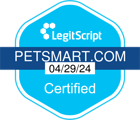Proin Chewable Tablets for Dogs - 50 mg
Proin Chewable Tablets for Dogs - 50 mg
- Quantity:
- 60 Count
About this item
Usage: *For complete product information, please review the full prescribing information in the manufacturer package insert. Proin Chewable Tablets should be given orally as directed by your veterinarian. Please consult your veterinarian before making any changes or discontinuing the prescribed dosing schedule. Proin Chewable Tablets are scored, and the dosage should be calculated in half–tablet increments. Ensure your pet always has access to fresh, clean drinking water while taking this medication.
Missed Doses: Administer the dose as soon as possible. If it is almost time for the next dose, skip the missed dose and continue with the regular schedule. Do not give more medication than prescribed or two doses at once.
Side Effects: The most common side effects of this medication include (but may not be limited to) increased thirst, vomiting, diarrhea, decreased appetite, lethargy, and restlessness. Your veterinarian may advise a lower initial dose and gradually increase over time to help find an appropriate dosage and avoid these effects. Contact your veterinarian immediately if your pet experiences complete loss of appetite, significant weight loss, seizures or collapse, abnormal gait (difficulty walking), extreme behavioral changes (e.g., anxiety, irritability, or aggression), vocalization, or if your pet displays any signs of an extreme increase in blood pressure (including disorientation, decreased coordination, blood in the urine, bloody nose, or sudden blindness). Notify your veterinarian if your pet experiences any of the effects described above, or if you notice any other side effects that are persistent or troublesome. If you notice anything unusual, please consult your veterinarian.
Precautions: *For complete product information including warnings and precautions, please refer to the manufacturer package insert. For oral use in dogs only– not for human use. Keep out of reach of children. Consult a physician in case of accidental ingestion by humans. PROIN may cause increased thirst; therefore, provide ample fresh water. Overdose has been associated with dogs chewing through closed bottles of PROIN and consuming multiple tablets. Therefore, it is important to store PROIN Chewable Tablets out of reach of dogs and other pets in a secure location. PROIN may mask signs of incontinence due to a urinary tract infection. PROIN is not effective in dogs with incontinence due to neurologic disease or malformations. PROIN may cause hypertension; therefore, use with caution in dogs with preexisting heart disease, hypertension, liver disease, kidney insufficiency, diabetes, glaucoma, and conditions with a predilection for hypertension (e.g., hyperthyroidism). Use with caution in dogs receiving sympathomimetic drugs, tricyclic antidepressants, or monoamine oxidase inhibitors as increased toxicity may result. Because this medication should NOT be used within at least 2 weeks of any monoamine oxidase inhibitor (e.g., selegiline, amitraz), it is NOT compatible with flea and tick collars that contain amitraz as an active ingredient. If your pet is currently using one of these collars, consult your veterinarian before starting this medication. The safe use of PROIN has not been evaluated in dogs that are intended for breeding, or that are pregnant or lactating. Discuss the risks of using this medication with your veterinarian prior to use if your pet is in one of these groups. Do not administer to animals with a known history or suspected allergy⁄hypersensitivity to this medication or any of its ingredients. Allergic reactions to medications may occur. Be sure to inform Vetsource and your veterinarian if your pet has any known drug sensitivities or allergies. If your pet displays symptoms of an allergic reaction, discontinue therapy and call your veterinarian immediately or seek emergency veterinary attention. Symptoms may include (but are not limited to): swollen lips, tongue, face, or airways; difficulty breathing; agitation; profuse salivation; and widespread hives or itching.
Drug & Food Interactions: The following drugs* may have potential interactions with this medication: alpha–1 antagonists (e.g., prazosin), inhaled anesthetics (e.g., isoflurane), antidiabetic agents (including insulins), aspirin, blood pressure medications (e.g., amlodipine, enalapril, telmisartan), digoxin, estriol (Incurin), MAOIs (e.g., amitraz, selegiline), oxytocin, phenothiazines (e.g., acepromazine), potassium citrate, sotalol, concurrent sympathomimetic agents (e.g., albuterol), and tricyclic antidepressants (e.g., amitriptyline, clomipramine). *NOTE: this may not be a comprehensive list. Contact your veterinarian if your pet experiences any unusual reactions when different medications are given together. Please ensure your veterinarian is aware of all medications and supplements that your pet is currently receiving. Your veterinarian may prescribe multiple medications, even if a potential drug interaction may occur. In these instances, your veterinarian may adjust the dosages or monitor your pet more closely.
Overdose: If you have any reason to suspect an overdose, call your doctor⁄veterinarian or the appropriate poison control resource immediately. For humans: The national toll–free Poison Help line, 1–800–222–1222, will connect you to your local poison center in case of emergency. This service is available nationwide and in most U.S. territories. For animals: The ASPCA Animal Poison Control Center is available 24 hours a day, 365 days a year at 888–426–4435. Pet Poison Helpline® also provides a 24⁄7 animal poison control service at 855–764–7661. *Please note: this information is for third–party services and is provided for convenience in case of potential poison–related emergencies. There may be consultation fee for these services.
Storage: Store in a coo



